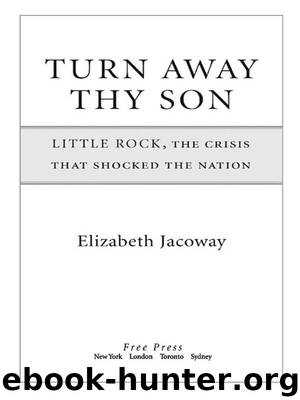Turn Away Thy Son by Elizabeth Jacoway

Author:Elizabeth Jacoway
Language: eng
Format: epub
Publisher: Simon and Schuster
Published: 2007-07-15T00:00:00+00:00
ORVAL FAUBUS LATER claimed that in the interim between the Supreme Court sessions of August 28 and September 11, he received a confidential message from one of the justices. Delivered by “a responsible federal official of unquestioned integrity and to me well known” (possibly Brooks Hays), the message was to the effect that the prospects were good for “something to be worked out” in which the Court would relax its heretofore inflexible stand on desegregation. The message may have been designed to keep the unruly governor quiet during the interim, but if so it did not work. On September 6 Faubus suggested to the closing session of the state Democratic Party convention that the Supreme Court justices were communists. Faubus believed there was a division within the Court, and that was the reason for the decision to wait two weeks to have another hearing. 68
The Justice Department had hoped to use the Little Rock bench rather than federal troops to forestall any potential racial unrest, by issuing injunctions against known troublemakers. Yet with Judge Lemley’s retirement, Arkansas had only one federal judge left, John Miller, who faced a backlog of cases. In August the Justice Department had sent four of its attorneys to Little Rock to assist Osro Cobb in preparing injunction petitions to restrain interference with the carrying out of the court’s orders. The Justice Department was trying to pave the way for the peaceful acceptance of what it thought would be the Court’s “inevitable decision.” Yet Attorney General Rogers also assembled a group of 137 United States marshals who were specially trained in riot control, and sent them to Little Rock. 69
Richard Butler had left the Supreme Court justices with the clear understanding that school would not start in Little Rock until September 15. That was the date spelled out in one of Faubus’s new bills, but the governor had not signed it into law, and so the formal date for school opening technically remained September 8. If, however, the high schools opened before the Court ruled, they would open segregated, and Faubus began to push for this to happen. The School Board was divided. Three of the members believed the schools should open as scheduled on the 8th, since the teachers had to be paid either way, but several board members also felt Faubus was trying to maneuver them into an open defiance of the courts. Dick Butler argued strenuously that the board did not want to prejudice its case, and that it must vote to change the date of school opening to September 15. The board at length decided to follow Butler’s advice and delayed the date of school opening for the high schools only (the junior high and elementary schools opened on the 8th), but they also decided that if the Court ruled against them and Faubus ordered the schools closed, they would comply. 70
This was the milieu in which Richard Butler struggled, under stress, in haste, and mostly alone, to write the most important brief of his legal career.
Download
This site does not store any files on its server. We only index and link to content provided by other sites. Please contact the content providers to delete copyright contents if any and email us, we'll remove relevant links or contents immediately.
| African-American Studies | Asian American Studies |
| Disabled | Ethnic Studies |
| Hispanic American Studies | LGBT |
| Minority Studies | Native American Studies |
Cecilia; Or, Memoirs of an Heiress — Volume 1 by Fanny Burney(32558)
The Great Music City by Andrea Baker(32018)
Cecilia; Or, Memoirs of an Heiress — Volume 2 by Fanny Burney(31956)
Cecilia; Or, Memoirs of an Heiress — Volume 3 by Fanny Burney(31941)
We're Going to Need More Wine by Gabrielle Union(19046)
All the Missing Girls by Megan Miranda(16023)
Pimp by Iceberg Slim(14506)
For the Love of Europe by Rick Steves(14121)
Bombshells: Glamour Girls of a Lifetime by Sullivan Steve(14073)
Talking to Strangers by Malcolm Gladwell(13370)
Norse Mythology by Gaiman Neil(13363)
Fifty Shades Freed by E L James(13239)
Mindhunter: Inside the FBI's Elite Serial Crime Unit by John E. Douglas & Mark Olshaker(9339)
Crazy Rich Asians by Kevin Kwan(9290)
The Lost Art of Listening by Michael P. Nichols(7506)
Enlightenment Now: The Case for Reason, Science, Humanism, and Progress by Steven Pinker(7311)
The Four Agreements by Don Miguel Ruiz(6765)
Bad Blood by John Carreyrou(6621)
Weapons of Math Destruction by Cathy O'Neil(6279)
